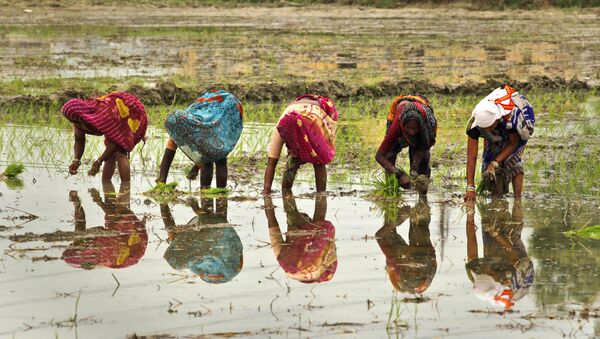Rahul Gandhi, from India’s main opposition party Congress, on Tuesday targeted Prime Minister Narendra Modi over the recently passed Farm Bills in parliament. Accusing Modi of implementing "anti-farmer" laws, Gandhi has described them as “Black Laws”.
Taking a jibe against the Modi government, Gandhi also said its policies are directed only for the benefit of the prime minister's corporate friends.
Gandhi said in a tweet, "In 2014, Modi promised to the farmers that the minimum support price (MSP) for agriculture products recommended in the Swaminathan Committee report will be given to farmers. However, in 2015, Modi government backtracked and said that it won't be able to implement Swaminathan panel recommendations on agriculture. In 2020, the Modi government brought the black laws on agriculture."
— Rahul Gandhi (@RahulGandhi) September 22, 2020
The MSP is the price at which the state procures agricultural produce from farmers at designated state markets known as Agriculture Produce Marketing Committees (APMCs).
Gandhi's tweet, in Hindi, goes on in the form of four rhyming lines. The sentences essentially mean that even though it is claimed that Modi's conscience is clear, there have been efforts to compromise the interests of farmers and serve the interests of friendly corporates.
The M.S. Swaminathan Commission was set up by former Prime Minister Manmohan Singh in 2004, when Rahul Gandhi’s Congress party was in power. The panel submitted five reports in 2004 and 2006 to alleviate the problems faced by the Indian farmers.
One of the key recommendations of the panel was to provide the MSP with 50 percent profit over the cost of production of agriculture produce.
In India, the government announces the rates for state procurement of agricultural produce at the time of the harvest season.
The MSP is one of the major bones of contention between the Modi government and the opposition in the two recently approved farm-related bills in the Indian parliament.
The bills in question are the Farmers Produce Trade and Commerce Bill, 2020 and the Farmers Agreement on Price Assurance and Farm Services Bill, 2020.
While the former allows farmers to sell their produce at places apart from their designated APMC market, the latter facilitates contract farming for the farmers, allowing them to enter into supply agreements with private firms.
The entire opposition is against the bills, which will become laws after President Ram Nath Kovind gives his stamp of approval for the bills, already passed by both houses of the parliament.
The opposition's key contention against the laws is that the government is replacing the age-old system of price assurance through MSPs and is leaving farmers at the mercy of corporates, who may have the upper hand in commanding high prices for agri produce.



